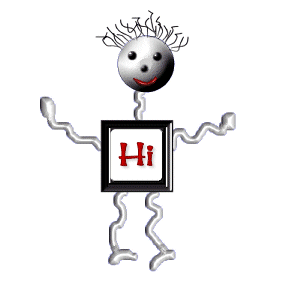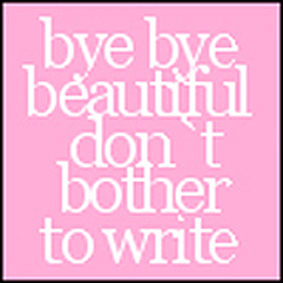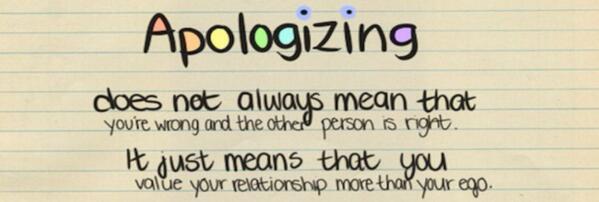•→ English greetings ←[introducing yourself & other people]
← There are many ways of bidding someone farewell →
Some are very specific;
others restricted to some territories.
¤ Vagueness in spoken English
Vague language is words and phrases that aren’t very exact or precise. You might want to use these phrases if you aren’t sure of all the details of something, to speak informally in a friendly way, or perhaps just to save time in a conversation!
Φ Vague nouns
The word thing refers to objects which aren’t described – we don’t know what the objects are, only that they exist! So in the sentence ‘There are a few things I’m not happy about’, we don’t know what the speaker is unhappy about.
Bit often refers to a part or section of something. Both bit and thing can be used if we don’t know the English word for something or if we’ve forgotten it – ‘I’ve broken my stapler… I dropped it and the bit which holds the paper in place snapped.’
The word stuff refers to more than one object. It is a non-count noun. ‘There’s loads of stuff in the attic – can you have a look and see if any of it’s yours?’
It can also be used to talk about ideas or words: ‘All this stuff in his speech about workers’ rights… do you think he actually meant any of that?’
Φ Quantifiers
Most quantifiers are quite vague. In this programme we looked at how the words one or two can refer to three, four or five things. ‘I expect the meeting will be quite short. We only have one or two things to discuss.’
Other quantifiers include: a few, a couple of, a lot of, plenty of, loads of.
Φ Vagueness and numbers
Some words allow you to give more detail than a quantifier but are still vague. You can use around and about to give a vague idea of a number. They can be used to give an idea of time or age too.
‘There’s about two hundred people outside.’
‘It must be around three o’clock now.’
‘He’s about fifty, fifty-five maybe.’
You can use the word odd to give an idea of a number (but not to indicate age or time). This is informal English. ‘Did you know there are loads of people outside? Must be 200-odd out there.’
Slightly more formal, you can use or so in the same way. ‘There are thirty or so leaflets there. Do you think you could fold them for me?’
Note that the phrase more or less is not usually used with numbers. It means ‘almost’, and we often use it to indicate if something is finished. ‘I’m more or less done here… I just need to double-check these sums before I print it off.’
Φ -ish
You can add -ish to give a vague indication of the time: ‘I usually get home about sixish, maybe half-six, depending on traffic.’
You can also add -ish to some adjectives. Used like this, it means ‘a little’ or ‘slightly’.
‘She has reddish hair.’
‘He’s a tallish guy… maybe 6 foot?’
-ish is informal English and you can use it creatively. It can even be used on its own to mean ‘a little bit’.
A: ‘Are you hungry yet?’
B: ‘Ish. I could eat, if you’re hungry.’
Φ sort of, kind of
These are useful phrases for giving a description of someone. They qualify a statement slightly, so if someone says, ‘She has sort of reddish hair, it is understood that this person’s hair is not completely red – it might be a little bit brown. It is not the description that is vague here, but the colour itself!
In some contexts, the phrase means ‘in some ways’: ‘It’s kind of crazy how they advertise jobs you can’t actually apply for.’
Φ and stuff, and everything, and so on
These phrases can save you from giving a long list of things. If someone says, She’s a typical little girl really – into dolls and pretty dresses and stuff,’ the speaker is saying that the girl is interested in dolls, pretty dresses and things similar to dolls and pretty dresses. The speaker has used two examples of her interests with ‘and stuff’ to give us a vague idea of her personality.
‘They sell loads of really cool stuff – all vintage dresses and everything.’ In this example, the shop sells vintage dresses and other related things – possibly, antique jewellery, shoes and hats.
∞ Reference:→ Vague expressions ⇐[quiz]
– Two straight-to-the point lessons by Kenneth Beare. Both contain an extra quiz to check understanding:
(1) Vague expressions & imprecise language ←
(2) Language & expressions used when →GUESSING←, which we do more often than we think.
♠ Conversation fillers … ⇒[01] ⇔ [02]⇐
♠ →Functional language frequently used in speech ←
♠ →Language used in responses & replies ←
∗→ Asking & Giving directions ← . . .
¤ Typical phrases used at various levels … (Basic through Advanced)←Functional language
→www.ihbristol.com/useful-english-expressions ←
→englishinbarcelona.wordpress.com/speaking/←
∞ Making invitations: accepting & declining⇐
• Suggestions & Advice … ⇒ [01] ⇔ [02] ⇔ [03] ⇐
•→Making offers — «I’ll…» / «Shall I…» / «Let me… (help you with your luggage)»
♠ How to make requests ⇓ (and respond) … →[quiz 01] ⇔ [quiz 02]←
•→How to ask for repetition⇐
•→Expressing lack of understanding & asking for clarification⇐
∇ How to give your opinion ↓ [quiz]←
 •→ Asking for people’s Opinions⇐
•→ Asking for people’s Opinions⇐
•→ Showing approval & disapproval ⇐[tut-tut]
⇒
∇ ‘What do you do for fun?’ ⇓
Φ Expressing likes & dislikes … ⇒[01] ⇔ [02] ⇔ [vid]⇐
•→Giving CLARIFICATION & EXAMPLES + DISAGREEING ⇐(formal)
◊ ‘EITHER’, ‘NEITHER’, ‘SO’, ‘TOO’ ⇔ How to agree and disagree
¤ Auxiliary verbs in replies . . . ⇒Agree or disagree ⇐
•→ How to agree with someone in an informal conversation⇐
¤ Expressions of confidence and doubt
I’m not sure, it’s kind of…
Oh, I don’t know, I suppose it’s…
I’m (only/just) guessing, but I would say it’s…
I think it’s . . . isn’t it?
I could be wrong, but I think it’s…
Correct me if I’m wrong, but I think …
I guess it’s…
It’s . . . I think/guess.
I’m not certain, but it could/might be…
Perhaps it’s . . . but I can’t be sure.
I can’t say for sure, but I think it’s…
I could be mistaken but I’m sure it’s…
I suspect/believe it’s…
I would say it’s…
I’m fairly confident it’s…
I have no doubt, I mean I’m sure it’s…
I know (for a fact that) it’s…
I’m positive it’s…
I’m absolutely certain it’s…
There’s no doubt …
«I wish I were what I was when I wished I were what I am.» Ladies’ toilet (Tonbridge)
•→ Wishes & Regrets ⇐
•→ http://www.slideshare.net/miriamacuna55/uses-of-i-wish-and-if-only⇐










Deja un comentario